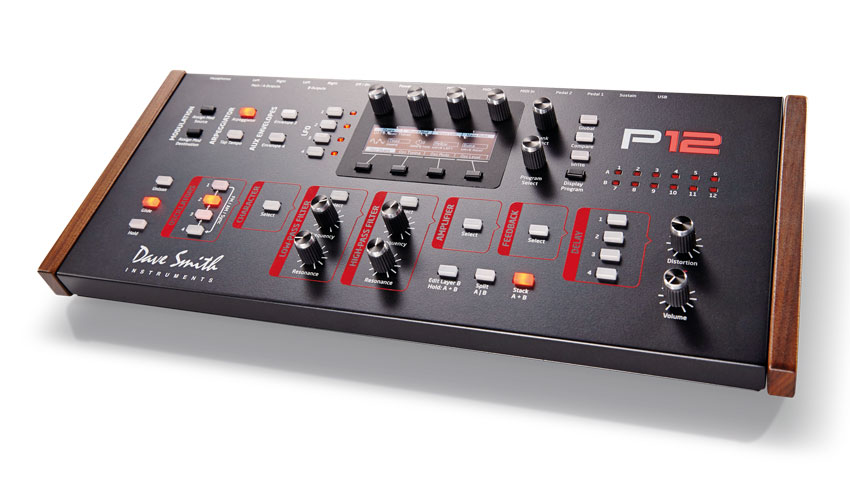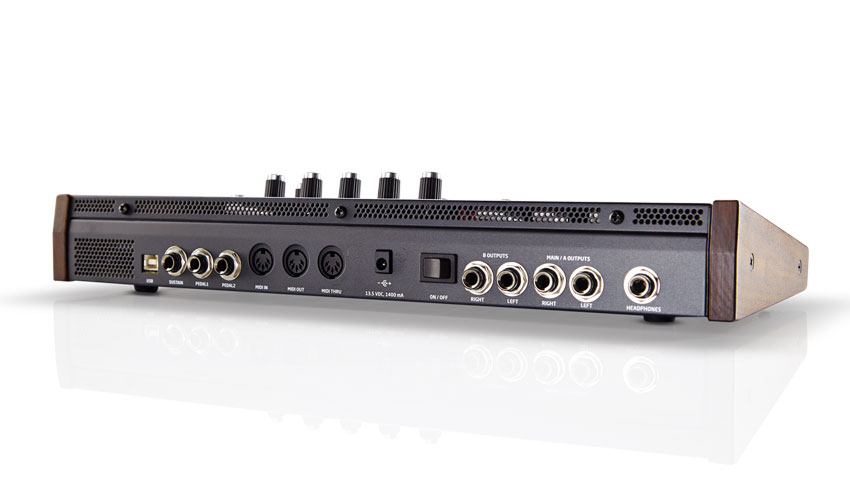MusicRadar Verdict
It has the P12K sound engine and features, but it's pricey and misses the knob-per-function ethos.
Pros
- +
Compact, very portable and well built. Same versatile sound engine as the P12 keyboard. Surprisingly easy to navigate.
Cons
- -
No direct controls for filter/amp envelopes. Editor should be included for free.
MusicRadar's got your back

DSI Prophet 12 Module

Rear
DSI's flagship Prophet 12 Keyboard came out nine months ago now and has developed a solid reputation amongst gigging keyboardists and studio-based producers.
This is largely due to the P12K's powerful four oscillator-per-voice, 12 note-polyphonic hybrid sound engine, which features digital versions of analogue oscillators plus digital complex waveshapes, all routed through DSI's analogue low-pass and high-pass filters, analogue delays and Character effects.
As the P12M and P12K share the same sound engine and most OS features, it's worth referring back to our DSI Prophet 12 keyboard review www. musicradar.com/reviews/tech/ dsi-prophet-12-583491, to get the lowdown on the finer aspects of the sound engine/OS. For this review we'll concentrate on the differences between the keyboard version and the module.
Spot the difference
The most obvious difference between the P12K and P12M is the lack of a keyboard, plus there are just 12 knobs onboard, compared to the P12K's 59. Like the P12K, the P12M is built like a tank with a tough metal case, solid wood ends, positive feeling red backlit buttons and tough rubber-coated chrome-topped dials with no wobble. The OLED screen and backlit P12 logo found on the P12K are also onboard and the P12M is rackmountable too, using the optional kit.
"The screen and soft dials take on a more dominant role compared to the P12K but the screen is a pleasure to use"
Due to the less knobby interface, the screen and soft dials take on a more dominant role compared to the P12K but the screen is a pleasure to use. It can be viewed clearly at all angles (and in all lighting conditions) and programming is never a chore.
The OS has been clearly thought out (although there's still no way to change the number of voices in Unison mode; it's still 'one voice' or 'all') but all major functions are only ever a couple of buttons presses away with surprisingly little menu diving.
However, it's a shame that the only major sound-shaping parameters that have direct dials are the filters and the distortion - especially disappointing considering the high price and how knob-laden the P12K and P08 module are.
Perhaps the biggest omission is not having direct controls for the filter and amp envelopes, which we use loads on other synths during live performances (we dare say many others do too) and we would have much preferred a knob-laden unit like the P08 module, although this would have likely made the P12M even more pricey (and it costs almost £1,700 as it is).
So, we have mixed feelings about the hardware design. Some will love its stripped down efficiency, but many will miss a full complement of dedicated real-time controls.
Thankfully, the P12M is easy to set up with most controllers and DAWs and in the back of the manual there's a handy list of all the transmitted and received MIDI CCs (119 in total) - simply connect a knobby controller over DIN MIDI or USB and assign the CCs.
There's also a MIDI Thru too (which is a bonus these days) and a SoundTower editor is available for $49.99, though it should really be included for free at this price point.
Classy sounds
Criticisms aside, the rest is pretty much all praise for the P12M. We like that you can throw it into a backpack and that it's tough enough to withstand gigging abuse. We also like that it's simple to get to grips within five minutes without the manual to hand and, above all, we love how it sounds and the new presets are miles better than the ones that originally came with the P12K.
"It sounds wide, juicy, full and present and every bit as a Prophet heritage synth should"
The sound of the P12K really impressed us when we reviewed it and in that respect the P12M is no different. It sounds wide, juicy, full and present and every bit as a Prophet heritage synth should. We have to say, we prefer the P12's overall character to the P08 as it seems to blend a little better with other instruments and not shout 'I'm here' all the time!
That's not to say that the P12 can't do upfront though - it can be one of the most upfront sounding synths around, particularly when you start pushing the distortion control and Character effects and when you wham all the oscillators into unison.
Huge pads, subtle atmospheres, screaming leads and punchy basses fall out of the P12 engine with no effort, though thicker Moog style basses (which tend to have a low mid bump around 250Hz) take a little more work to obtain due to the cleaner oscillators/low-end and less bassy filter response, but you can get in the right ballpark with careful use of the feedback control/filter resonance and Character effects.
Nonetheless, classic DX-style FM sounds are easy to obtain and the P12M excels as a pad, lead and FX machine. The four LFOs and four envelopes (two assignable) are especially handy and there are 26 mod sources and 97 destinations too.
And let's not forget that there are some useful improvements in this latest P12 OS - you can now access the A and B layers in a split or stack from separate MIDI channels (the P12K couldn't do this when we reviewed it) and there's also a new high-pass/low-pass filter mode for the Delay section too.
Interface/price gripes aside, the P12M is a deep and versatile synth with a sound that's raw yet classy. However, if you prefer more knobby interfaces and can afford the extra £500, we'd say go for the P12K instead, as it's a more complete instrument.
On the flip side, if you don't have the space, you don't mind a more streamlined interface and you want the P12 sound in a more portable package, then the P12M is certainly the box for you.
Brace yourself: Bryan Adams didn’t buy his first real six-string in a five and dime
“Nobody listens to one genre. I literally don’t know anybody who listens to one genre. You can be a fan of so many different artists at once”: Laufey on what Gen Z can teach the rest of us about how to appreciate music
Bon Iver - ranked: from Sable, Fable to For Emma, Forever Ago









